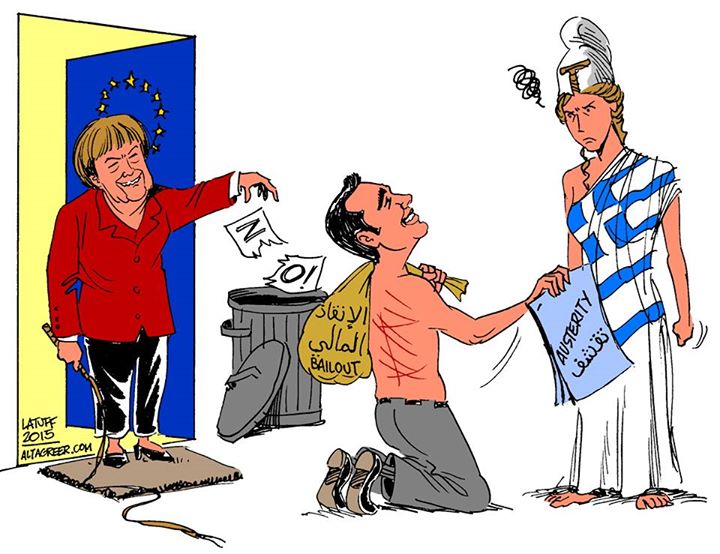The position I will be defending in this short intervention is that the subjection of Greece to memoranda and its consequent social and economic destruction is not simply a product of the global economic crisis that was initiated in the United States in 2007-2008, with the explosion of subprime loans and the collapse of Lehman Brothers, and then exported from America to Europe. In fact, hidden behind all this was a set of machinations undertaken, on the occasion of the crisis, by the European Directorate, which is mainly controlled by German interests.
At that moment, that is in the late 2008 and early 2009, Greece was run by the conservative government of Costas Karamanlis, who was reassuring the internal audience that Greece’s economy and its banking system were absolutely safe. And this, not only because of the supposed dynamism of the Greek economy, but also because of the fact that the Greek banking system was not exposed to high-risk lawns. At the same time, the Greek government knew very well that it could no longer borrow from the international markets in order to refinance its debt. Following a common recommendation on behalf of European leaders to both the Prime Minister Caramanlis and the leader of the opposition and head of PASOK George Papandreou, elections were set for the autumn of 2009. In the ensuing electoral campaign, the Prime Minister, well aware of the coming crisis, kept a low profile, while advocating the need for harsh measures to be taken in order to avert the danger. In contrast, PASOK leader George Papandreou was promising generous benefits to all.
Having no idea of the real situation in which the country had entered, the Greek people gave PASOK a smashing victory with a 43% of the vote. The outgoing Prime Minister Karamanlis essentially vanished from the public scene, remaining silent as to what had happened up to then. While his government had announced an economic deficit of 6.9%, the new Papandreou government claimed it had reached 10%. Following new calculations, with the agreement of European officials, the deficit appeared to exceed 15%. This was due to the introduction of new parameters in its measurement, such as the deficits of Public Organizations, which almost no other country in the European Union takes into account in calculating the national deficit; it was also due, as it later became apparent, to data corruption effected by the Greek Statistical Service and its director Andreas Georgiou, appointed by the new government and favored by both EU and IMF officials. Let me note that Mr. Georgiou today stands accused of having forged Greek deficit numbers. In 2009, Greece’s borrowing from the markets became impossible on such economic evidence. The bonds of the Greek Public Sector possessed by French and German banks, which then exceeded 70 billion euros, were in danger of terminating without being paid, thus taking down with them the common currency itself (the euro). Obviously, this could not be tolerated by the European elite and its organs, since the euro was the mechanism that guaranteed the transferable securities (bonds etc.) on which it had invested, as well as its further profitability.
As the making of the Euro-system did not include mechanisms for dealing with the crisis, unbearable pressures were exercised on the Greek government, with the threat of immediate bankruptcy, to get it to sign the first memorandum in May 2010, allowing for a 110 billion euros loan to be granted, but also for the IMF to take part in European affairs starting from Greece. Among other things, the Greek government accepted that the new loan would come under British law, and no longer under Greek law – up to then, the latter gave jurisdiction to the Greek courts and consequently ample time to the Greek government, apart from being less burdensome for the borrower. The loan agreement and the ensuing memorandum, while being presented as a necessary condition in order to save citizens’ wages and pensions, actually hid their true aims, which were, on the one hand, to provide French and German banks with enough time to disinvest themselves from the Greek bonds they possessed –which they achieved within only a year– and, on the other, to assure the manipulation and control of the country through the terms and mechanisms they established. The sum total went to the Greek banks and to the payment of debts, without actually helping the Greek economy.
Greek society did not remain idle, and a considerable strike movement began to manifest itself, undermined of course by the union bureaucracies that have been aligning themselves to government policy and controlling workers’, peasants’ and public sector unions throughout the long period of PASOK’s rule. Massive protests, on a scale unknown since the days of the reestablishment of democracy in 1974, started to materialize, and, while suffering a temporary drawback after the death of five people in a suspect fire in an Athenian bank during a mass demonstration, they soon resurfaced and climaxed in the great “movement of the squares” in the spring and summer of 2011; this witnessed the participation of hundreds of thousands of people and exercised unprecedented pressure on the government and the whole Greek political establishment. Under such conditions, imposing further memorandum terms and constraints on Greek society required no less than an actual parliamentary coup: the story is well known of how, in the European summit meeting at Cannes, the compliant government of George Papandreou and he himself were pushed (with the French President Sarkozy almost climbing on the conference table and calling him a “fucking psycho”) to refrain from a timidly proposed Greek referendum that would have at least allowed the people to take a stand on European loan agreements. The summit led, on that same night (and on the initiative of Foreign Affairs Minister Evangelos Venizelos), to the replacement of the elected Prime Minister Papandreou by the technocrat Loucas Papademos, a favorite of EU institutions and the markets.
On the following year, after the double elections of May and June 2012, the Greek political system was drawn to the formation of a government coalition between the two major parties, PASOK and New Democracy (together with the small extreme right-wing party or LAOS and the small center-left party of DIMAR). This went on to sign a new loan agreement and a memorandum of 130 billion euros, most of which was allocated to the payment of maturing bonds of the Greek Public Sector and the recapitalization of Greek banks, which were again on the verge of collapse. Once more, despite the excessively binding terms of this agreement and of the concomitant memorandum, the whole funding was directed outside the Greek economy which it was supposed to support so as to overcome the crisis. While the first memorandum, apart from forging strong ties of dependence for Greece, had aimed at people’s salaries and pensions, the second memorandum mainly targeted public property through the creation of divestment mechanisms such as the ΤΑΙΠΕΔ (Public Sector’s Private Property Valorization / Exploitation Fund). Although social mobilization was still impressive, the rise of the SYRIZA party into the major anti-memorandum force in Greece tended to disempower resistance movements and block anti-memorandum outbursts, locking them into its governmental prospects and limiting them to the role of “assignment”. That is, SYRIZA and its young leader Alexis Tsipras promised that simply their assumption of power would force Greece’s European partners to forego all memoranda so as to allow for a commonly accepted solution promoting the development of the Greek economy, rather than its destruction through austerity, to come to the fore. The Greek people continued to manifest its rejection of foreign dictates and its evolving political consciousness by moving from the right and center of the political spectrum to what appeared to be a genuine anti-memorandum force of the radical left, and gave SYRIZA a landslide electoral victory in January 2015 and the possibility to form a comfortable governmental majority in coalition with the radical right-wing party of ANEL.
As it soon became evident, SYRIZA had no program of negotiations, nor any plan for defending Greek society against the weapons of economic asphyxiation held by the European Central Bank. Its only assets were the gambling theories of its Minister of Finance Gianis Varoufakis. Its leadership had already abandoned any claim to national sovereignty, substituting the influence of the American factor for popular mobilization in its negotiations with European organs. After six months of rather pointless such negotiations, and despite the quasi-shutting down of the banks and the imposition of capital controls in July 2016, the Greeks once more reasserted their opposition to foreign occupation by giving a 62% vote against memoranda in the referendum theatrically launched by the SYRIZA government. I say “theatrically” because this referendum was not intended to rally the people in the prospect of deliverance from the shackles of the memoranda, but rather to be used as a simple bargaining chip by an already subordinated government. Indeed, referendum results notwithstanding, the government came to sign a third, even more crushing memorandum, which includes, apart from everything else, the unheard-of condition that lenders are entitled to approve in advance every legislative initiative of the Greek government, thereby giving up any sense of national sovereignty.
Greece is an experiment, according to which, a country belonging to the first world is being violently downgraded to a third world country. We believe that this is a treatment that all European district countries are about to undergo, except of the metropolitan ones. It is possible that countries such as Italy, due to its strong weight, as well as Portugal and Spain are to be exempted from this procedure due to economical, historical and political reasons. The countries of the European district, such as Greece, will be vanished as states, its public and private assets will be disposed of, in order to become the base in rem of the global financial extension. This last one, without values in rem, is economy to a complete destruction at a global scale. These countries are about to be divided into special economic zones exempted from state laws of any kind, such as labour, administrative, fiscal, or infrastructural, which leads to the destruction of the state both as an entity as well as a rule of law.
Greece is a country already under occupation. This might come as a surprise to some people but let’s get things in the right order. To begin with, a country is being occupied not only military but economically as well. The occupational status is being differentiated both by the colonial domination of a country and the protectorate and its status as well.
During the colonial domination, f.e. in India which was under the British control, there was an administration, all over the Indian Territory, responsible for the application of the English law in order to secure the interests of the Metropolis. The case is the same with protectorates, where an administrative mechanism is being established in order to secure foreign interests. In contrast, what happens today in Greece is the termination of both the state and the public administration as well and the non implementation of legal rules. This is, without a doubt, a regime of domination, which reminds us of the German occupation of Greece, lasted from 1941 to 1944, during which every aspect of the Greek administration was abolished by the Germans. The same thing happens nowadays in Greece and the absence of tanks and foreign military forces is the only thing missing from the real nature of the regime that Greek people are experiencing today.











